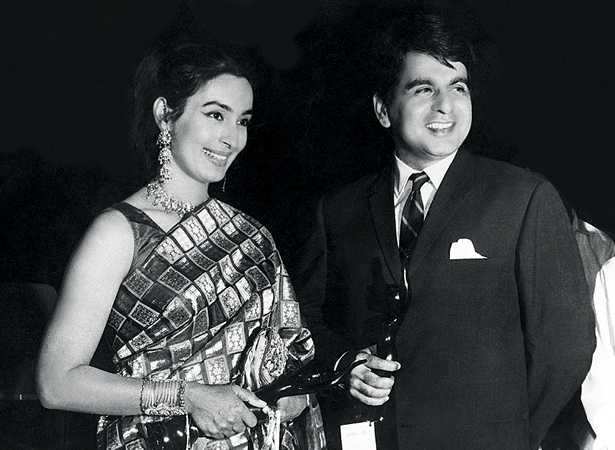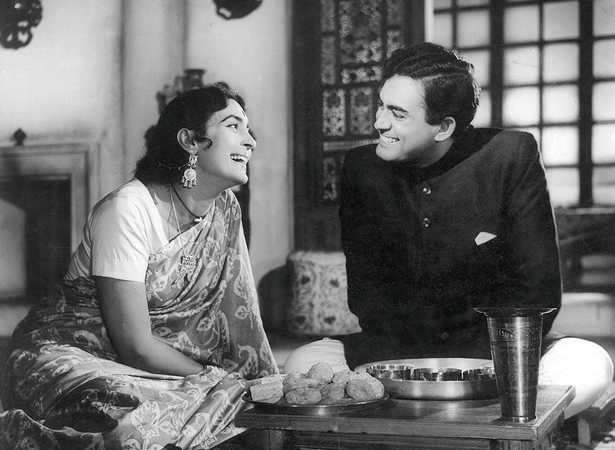An astrologer once told her mother/actor Shobhna Samarth that young Nutan was a ‘great soul’ who was ‘reluctant’ to return to this world. Uncannily, Nutan, even in her 20s, played characters that were way beyond her age and also her times. She was no tragedienne who marketed tears and victimhood. Rather, her characters were about yearning, learning and evolving. They went through the entire graph of suppression and self-realisation. Like the delinquent in Seema who attains redemption. Or the exploited actress in Sone Ki Chidiya who finds her bearings. As the outcast fighting for acceptance in Sujata. Like Kamala torn between the insanity of love and the sanity of duty in Bandini. Or the slighted but self-respecting Mahjabeen in Saudagar… if there’s anything that Nutan’s characters stood for it was dignified feminism...
And yet the personal life of this liberated performer was allegedly overcast by shadows compelling even the late Dev Anand, with whom she did Paying Guest, to once tell Filmfare, “There was a streak of sadness in Nutan. The last part of her life was so sad.” While none has been privy to the truth, Nutan’s close friend and author Lalita Tamhane has recorded memories and moments of the late actor as shared by family and friends in the book Nutan - Asen Mee.. Nasen Mee. Read on as Lalita looks back at her ‘friend, philosopher and guide’…
The Interview
I always admired Nutanji as an artiste. But I never got the opportunity to meet her. I knew her mother Shobhnaji (Samarth), her sisters Tanujaji and Chaturaji and even their nani (maternal grandmother) Rattan Bai Shilotri - she had acted in Swarajyachya Seemewar. But I didn’t want to use those contacts. I wanted to meet her as a journalist on my own accord.
Those days I was to interview Rati Agnihotri for Chitranand magazine. So I often visited her on the set of Rishta Kagaz Ka (1983). Nutanji was in the film too. She must have been in her 50s then. But I had no guts to approach her. One day I learnt that she was to be the chief guest at a car showroom. I waited for hours there to meet her. Finally, I did and introduced myself. Many phone calls later we met at Essel Studio. We spoke the whole day but there was no interview. Soon after that her landline went dead and there was no way to contact her.
Then one morning, as I sat writing in my bungalow in Thane, the door bell rang. My sister came running to say, “Nutanji is at the door.” I ran to welcome her. She had come to a bank in the vicinity (she had a beautiful bungalow in Mumbra, near Thane). She had come to inform me that she was shooting at a particular location and that I could do the interview there. My respect for her increased double fold after this. She made it clear at the onset that I do not ask about her marriage (to Lieutenant Commander Rajnish Behl) or how she got married. And I always respected that.
The bond
Through the years, we developed a close bond. She’d come home at least twice or thrice a week. She’d park her car outside. There were tuition classes in the vicinity. The students, on learning about her arrival, would rush in our house to get a glimpse of her. She’d go to the kitchen and ask my mother what she had prepared. “Mee jevnaar aahe (I’m going to eat here),” she’d say. Like her, we belonged to the CKP (Chandraseniya Kayastha Prabhu) caste. So she enjoyed our cuisine. Chauli chi amti was her favourite. Usually, she didn’t have sweets. But she’d happily have homemade sweets. Also, she’d insist on picking her plate herself. After lunch, she’d pull out her diary and sing the bhajans she had written. Sometimes she’d take me along to her bungalow in Mumbra to chat and later drop me home. She came to love me like a daughter. She confided in me. She trusted me. When I got married, she wrote me
a letter, which began with ‘Aatma swaroop Lalita’ and signed it off with ‘Om’. She had stopped sigining as ‘Nutan’ by then. Despite being a top star she remained unaffected by name, fame or glamour. I always saw her in simple sarees or churidars. She wore no make-up except lipstick and tied her hair back in a juda (bun). The only accessories she’d wear were small earrings and a watch. She was naturally beautiful. She didn’t have a single white hair. In fact, good friend and photographer, the late Gautam Rajadhyaksha, said something to the effect, “From a photographer’s point of view, I’ve come across only two perfect faces. One is that of Nutan. Shoot her at any time, in any costume, at any angle… even without make-up and she’s beautiful. The other is Madhuri Dixit.” So upright was she that nobody dared to misbehave with her or with anyone else when she was around. Except for the alleged incident on the set of Devi (1970) where she reportedly slapped co-star Sanjeev Kumar. All she said to me about that was, “Sometimes people misbehave with you. You have to show them their place.”
As an artiste she was magnanimous. K Asif’s Mughal-E-Azam (1960) was first offered to her. She was honest enough to understand that she didn’t suit the character. Instead she suggested Madhubala’s name. After 36 Chowringhee Lane (1981) she wrote a letter of appreciation to Jennifer Kendall for her performance.
Marriage
Nutanji married naval Lieutenant-Commander Rajnish Behl in 1959. She believed in the institution of marriage. “No matter what, you have to save the marriage,” she’d say. She never spoke about whatever troubles she may have allegedly undergone.
It remained a secret.
Nutanji had announced that she wouldn’t be working after marriage. But fortunately for us, her husband made her change her mind. When Bimal Roy approached her for Bandini she refused it. Bimalda adamantly said he wouldn’t make the film if she didn’t say yes. Rajnishji urged her to listen to the script. She loved it. He persuaded her to change her decision. So somewhere we have to be grateful that he gave Nutanji back to us.
She loved her son Mohnish dearly. She was protective and worried about him and his career. Initially, he wanted to be a pilot. Then at one time, she wanted to buy him a petrol pump. At some point she even wanted to launch a recording studio for him.
Family feud
There was an allegation that Shobhnaji had mishandled Nutanji’s funds. A court case ensued. There was no communication between the Samarth family and Nutan for almost two decades. Even if they happened to cross each other they wouldn’t look at each other. Once Nutanji was to fly to Chennai. She found Tanuji in the same plane. She got off that flight and boarded another. It was that bad. But there was no harsh feeling in the Samarth family for Nutanji. Shobhnaji, Chaturaji and Tanuji loved her and trusted her. They understood why she did what she did. She’d often pass Usha Kiran, the building at Peddar Road where Shobhnaji lived. Instinctively, she’d turn around to glance at it. Once, when she heard that her grandma was ill, she went to Usha Kiran and met the family there after 20 years. Both parties had undergone immense emotional trauma. But there was only love and affection for each other. That day I happened to call Tanuji. She said excitedly, “Guess who has come to our house? Tai has come!” Nutanji also spoke to me over the phone. I lived their moment of reunion from my house in Thane. It seemed as though they had never separated. Finally, around 1983, the case was settled. Jaideepji put it humorously to Shobhnaji saying something to the effect, “You didn’t give dowry during the time of marriage. That you have given now.”
Spirituality
Nutanji was always spiritually inclined. In fact, Shobhnaji once shared that as a newborn she’d cry everyday from 5 in the evening to 5 in the morning. She consulted doctors who found nothing wrong with the baby. Then an astrologer told her, “She’s a mahaan atma (pure soul), who didn’t want to be reborn. But something was left incomplete. Hence she had to come.”
Nutanji wrote bhajans even as a child. When she was older she wrote, composed and even sang them. She didn’t know Sanskrit but she’d uncannily weave Sanskrit words into them. She’d attend satsangs (spiritual discourses).There was a Radhe Krishna temple in Kalwa in Thane. We’d often visit it and there she’d share a lot with me. She was disturbed about many things. Sometimes, post midnight, around 12.30 am, she’d call me up and say, “I’ve written a bhajan. Can I recite it?” I have a diary of her bhajans. At first, she wrote about Lord Krishna. Later, she revered a lady guru. Tanuji and Shobhnaji would say that even as a child her nails and palms had the fragrance of chandan oil.
The illness
The illness began with ‘a biting sensation’ in the armpit. She was detected with cancer in 1990. “Aaj mi sutli (today I’ve been set free)!” she told Shobhnaji with a sense of relief the day she was detected with cancer. She returned the signing amount of some films. She was shooting for Garajna (1991) those days. She asked the producer to complete her portions soon. “I don’t have much time,” she said. Later the cancer spread to the liver. She passed away on February 21, 1991. After her demise, Shobhnaji would say, “Meri Meerabai chali gayee.”
Once we were at their Lonavala cottage with Shobhnaji when we were enveloped by the fragrance of chandan. I was reminded of Nutanji’s words, “Asen mi nasen mi… whether I’m there or not, I’ll be there forever,” Hence the title of the book. I began writing it after her death. We asked Mohnish to share his memories too. But he didn’t want to. Tanuji and Jaideepji also tried. You can’t force anyone, so we let go. ‘Letting go’ is one thing
I learnt from Nutanji. She’d say, “Lalita, let go and life will be easier for you.” She’d also say, “I believe I have no enemies.” She did suffer from emotional pain. But when she learnt to let go, she was at peace.
NUTAN’S Filmfare Awards
Best
Actress
◆ Seema (1956)
◆ Sujata (1959)
◆ Bandini (1963)
◆ Milan (1967)
◆ Main Tulsi Tere Aangan
Ki (1978)
Best
Supporting Actress
◆ Meri Jung (1985)
NUTAN’S Memorable Songs
▼
Suno chhotisi gudiya ki lambi kahani
Seema
▼
Kaali ghata chhaye mora jiya lalchaye
Sujata
▼
Mora gora ang lai le Bandini
▼
Tumhi mere mandir
Khandaan
▼
Hum tum yug yug se
Milan
▼
Chhod de saari duniya
Saraswatichandra
▼
Tera mera saath rahe
Saudagar

